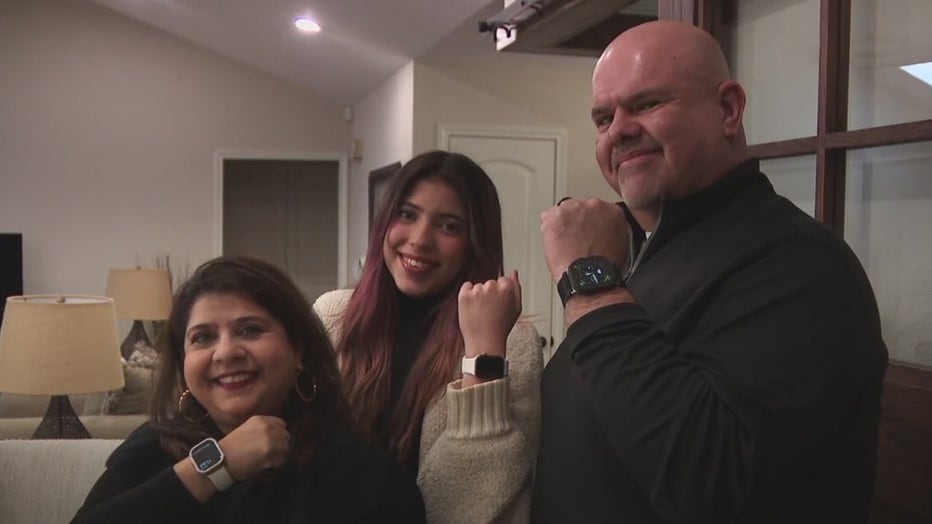Austin man credits Apple Watch notifications with saving his life
Apple Watch may have saved Austin man's life
For Austinite Mike Gomez, his Apple Watch was just another tool to track his workouts and monitor his calories, but an unexpected notification may have saved his life, according to his doctors.
AUSTIN, Texas - An Austin man is alive today after an unexpected notification on his Apple Watch about his heart rate prompted him to seek medical attention.
Local perspective:
Imagine getting an alert on your wrist telling you something’s wrong with your heart—despite feeling perfectly fine. That’s exactly what happened to Mike Gomez, when doctors told him the unexpected notification may have just saved his life.
For Gomez, his Apple Watch was just another tool to track his workouts and monitor his calories.
However, on Jan. 24, Gomez got an alert he had never seen before: an elevated heart rate warning, followed by more notifications.
"The fifth notification that said we have detected, you know, atrial fibrillation. Contact your emergency. Contact your health professional immediately. And I was like, wow that's pretty strange," said Gomez.

Even though Gomez felt fine, he decided to listen to his watch and go to the hospital.
"They said, yeah, well, let's go ahead and hook you up, and check you out and, you know, see what's going on. And sure enough, they confirmed it within a minute of hooking up like, yeah, you're in serious Afib right now," said Gomez.
Atrial fibrillation, or Afib, is an irregular heartbeat or arrhythmia, says the American Heart Association, which can lead to blood clots, stroke, heart failure and other heart-related complications. The AHA says over five million Americans have Afib.
Thankfully, Gomez was able to get the help he needed and was told, had he not come in, he could have had a stroke which would have likely killed him.
What they're saying:
For Gomez’s daughter Jazmin, the experience changed her perspective.
"That definitely opened my eyes on how I need to spend more time with them, and I definitely appreciate them a lot more for everything they do," she said.
For Mike, he’s sharing his story to encourage others to take their health seriously.
"Do everything you can to, you know, make sure you're, you know, at your best. And so whether it's buying a smartwatch or, and, you know, going out for a walk, you know, do what you can because, you know, we're not promised tomorrow," he said.
Heart disease and American Heart Month
Big picture view:
Gomez’s story is a powerful reminder that heart disease often goes unnoticed until it's too late.
"Believe it or not, about 40% of people that we surveyed were not aware that smoking or alcohol consumption or lack of sleep actually is related to heart disease. Another large percentage didn't know that air pollution, for example, or that diabetes during pregnancy had also related to heart disease," said Dr. Emanuel Finet with the Cleveland Clinic.
By the numbers:
Heart disease is the leading cause of death for both men and women in the U.S.
The American Heart Association says in its 2025 report that, based on 2022 data, on average, someone in the U.S. dies of cardiovascular disease (CVD) every 34 seconds. That's 2,580 U.S. deaths each day, and in 2022, CVD was listed as the underlying cause of death for 941,652 people in the U.S.
Heart disease and stroke claimed more lives in 2022 in the United States than all forms of cancer and chronic lower respiratory disease combined, says the AHA.
What you can do:
The American Heart Association says there are eight key health factors and behaviors involved in increasing or decreasing the risk of heart disease and stroke.
The nonprofit calls them "Life’s Essential 8" and measures them to track progress towards improving cardiovascular health: not-smoking, physical activity, healthy diet, healthy body weight, sleep health, and control of cholesterol, blood pressure, and blood sugar.
Raising awareness on heart disease
In this edition of Health Beat, we are focusing on American Heart Month and efforts to raise awareness.
Dr. Vivek Goswami, a cardiologist with Heart Hospital of Austin and Austin Heart, spoke with FOX 7 Austin's Rebecca Thomas during a recent HealthBeat about heart health.
Dr. Goswami says that people need to start taking better care of themselves on a day-to-day basis.
"We really should be viewing things like exercise as a prescription, not just a recommendation. So right now, a lot of people feel that exercise is kind of the selective thing that they can get to. If it's convenient, it's a good thing to do. We really should be viewing a day without exercise, similar to a day of not taking our medicines. And that goes for what we're eating as well. Our kitchens are killing us and when we have a meal choice, we should always be calculated about what we're putting our body and make healthy food choices. These day-to-day things that we've heard ever since we were young, really, really a big, big difference in terms of prevention of heart disease, cancer, stroke and a lot of the other leading causes of death in the United States," Goswami said.
The Source: Information in this report comes from reporting by FOX 7 Austin's Jenna King and the American Heart Association.

